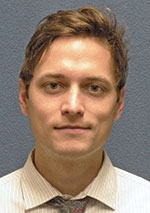Investing with Faith / Jim Maslar
Planned giving seminars empower donors to make a lasting impact
 I knew next to nothing about “planned giving.” As far as I could tell, that meant writing your check for the Sunday collection basket ahead of time or perhaps including your tithing in your monthly budget.
I knew next to nothing about “planned giving.” As far as I could tell, that meant writing your check for the Sunday collection basket ahead of time or perhaps including your tithing in your monthly budget.
As a former high school theology teacher, yes, I understood “stewardship” and the idea of giving back to God, but certainly had never thought of it in the context of a
long-term plan or my life’s “legacy.” After joining the archdiocesan Office of Stewardship and Development nearly three years ago, I had to learn about planned giving from the ground up.
One of the most helpful learning experiences for me was sitting in on several parishes’ planned giving seminars in my first year. Collaborating with the parish in its content and speakers, our Catholic Community Foundation co-hosted these educational, no-pressure seminars for any interested parishioners. Oftentimes, the pastor would speak on spiritual aspects of
long-term planning (such as funeral planning, Catholic advanced medical directives, last rites, etc.), a parish staff member or other professional might speak of the nuts-and-bolts of estate planning (wills, trusts, power of attorney, etc.), and a representative from our office would share some basic information and ideas concerning Catholic planned giving (charitable considerations, giving strategies, gift options, etc.).
For a novice like myself, the seminars were a great overview of how the spiritual, logistical, financial and charitable are all working components of a person’s plans and legacy. They each can play off the others to “tell the story” of our life and values—to our families, communities, friends, and, in some ways, to ourselves.
Planned giving, in a unique way, can play a most meaningful role in expressing this narrative. Hearing stories and follow-up questions at the seminars, it also became clear that many found it as a way to not just “tell their story,” but to offer a great act of gratitude to God and to the Church, and to give back to the people and places that they cherish.
Further, as a person of modest means, I learned that planned giving was not something just for “the rich,” but for anyone and everyone. A planned gift is any charitable donation made in life or at death as part of a person’s overall financial or estate planning—no matter the size or income level of the giver. The Gospel story of the widow’s offering, Mk 12:41-44, says it best.
Some planned gifts require no immediate out-of-pocket expense, but simply include naming a parish, school or agency as the recipient of a future gift (i.e., I could name my parish as an X% beneficiary of my 401[k]plan). Some involve making a charitable contribution now (i.e., I could direct my IRA’s required minimum distribution each year to our college seminary’s endowment). There are even ones that provide me (and/or a loved one) fixed income for life, which will eventually benefit the Catholic ministry of my choice (i.e., a charitable gift annuity).
In these past three years, I’ve found that many of my fellow Catholics have a provisional understanding, like I did, of what planned giving is; they are often empowered and energized when they learn about it.
Perhaps you would like to learn more or offer a planned giving seminar at your parish, alma mater or Catholic charity agency. Contact us: we are here to serve you. We especially invite pastors and staff members to reach out if you would be interested in learning more about hosting a planned giving seminar for your supporters.
(Jim Maslar is a Catholic philanthropic advisor for the archdiocese. Tax or legal information provided herein is not intended as tax or legal advice. Always consult with your legal, tax or financial advisors before implementing any gift plan.) †
 I knew next to nothing about “planned giving.” As far as I could tell, that meant writing your check for the Sunday collection basket ahead of time or perhaps including your tithing in your monthly budget.
I knew next to nothing about “planned giving.” As far as I could tell, that meant writing your check for the Sunday collection basket ahead of time or perhaps including your tithing in your monthly budget.